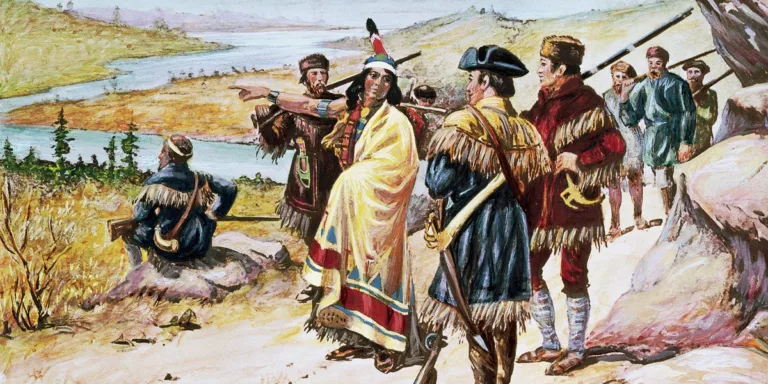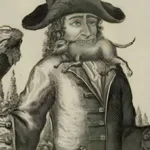Sir Walter Raleigh was a man who lived life on his own terms, forever etched in history as an explorer, writer, and courtier of immense charisma. He was born into privilege during the reign of Queen Elizabeth I, a period brimming with adventure and Intellectual Exploration. This fascinating figure, one of England’s Most Celebrated Sons, left behind a legacy intertwined with both daring exploits and bitter betrayals.
His life reads like a tapestry woven with threads of daring voyages Across Uncharted Seas, poetic verses that captured the hearts of his contemporaries, and courtly intrigue that swayed the very foundations of power. Raleigh was a true Renaissance man, excelling in diverse fields and shaping the Elizabethan era with his boundless ambition and undeniable charm.
From establishing a colony on Roanoke Island to penning influential writings on history and philosophy, Raleigh’s impact resonated far beyond the confines of his time. His story offers us a glimpse into a world teeming with possibility, where exploration was paramount, Intellect Held Sway, and even the most ambitious dreams could be pursued with unwavering zeal. Learning about interesting facts about Sir Walter Raleigh unveils a man who dared to Dream Big, Navigate Treacherous Waters, and leave an indelible mark on history.
Elizabethan Era Explorer & Courtier
Raleigh’s ambition was as vast as the oceans he sailed. As a courtier under Queen Elizabeth I, he navigated the intricate world of politics and intrigue with grace and cunning. His charm and sharp wit captivated the queen, earning him a place among her Most Trusted Advisors. But Raleigh’s heart yearned for adventure beyond the gilded halls of court.
He craved the thrill of discovery, the chance to chart unknown territories, and leave his mark on the World Through Exploration. Raleigh was a man driven by a thirst for knowledge and a desire to expand England’s dominion across the globe. His expeditions took him to far-flung corners of The New World, Where He Sought Gold, glory, and the promise of new lands for colonization.
These daring voyages made him a legend in his own time, cementing his place as one of England’S Greatest Explorers. His tales of adventure captivated the Public Imagination, fueling a spirit of discovery that swept across Europe. It was during this period that he established Roanoke Colony in present-day North Carolina, marking a pivotal moment in English Colonization Efforts. While the colony ultimately disappeared, shrouded in mystery, it remains a testament to Raleigh’s audacity and pioneering spirit.
The Roanoke Colony: A Failed Settlement
In 1587, Sir Walter Raleigh set his sights on establishing a permanent English settlement in The New World. He envisioned Roanoke Island as a beacon of civilization, a thriving outpost for trade and expansion. The colony was meticulously planned, with colonists carefully selected for their skills and resilience. Led by John White, an experienced explorer, they embarked on this ambitious endeavor, carrying with them hopes for a Prosperous Future.
Unfortunately, the reality proved far more challenging Than Anticipated. The settlers faced relentless hardship – Harsh Weather Conditions, Dwindling Supplies, and hostile encounters with Native American tribes. When John White returned to England for reinforcements, war erupted in Europe, delaying his return for three agonizing years. Upon his arrival back on Roanoke Island in 1590, he found the colony deserted, abandoned without a trace.
The fate of the Roanoke colonists remains one of history’s Most Enduring Mysteries. The only clue left behind was a single word carved into a tree: “Croatoan.” This enigmatic message has fueled speculation for centuries, with theories ranging from assimilation with Native American tribes to mass exodus or even disease outbreaks. Despite countless investigations and attempts to unravel the truth, The Roanoke Colony remains an enigma, a haunting reminder of the fragility of human endeavors in the face of adversity.
 Evil Stick Princess Wand: A History of Innocence and Darkness
Evil Stick Princess Wand: A History of Innocence and DarknessLiterary Contributions & Ambition
Beyond his daring expeditions and political maneuvering, Sir Walter Raleigh possessed a sharp intellect and a passion for the Written Word. He wasn’t just an explorer; he was also a gifted writer whose works captured the imagination of His Contemporaries. His writings on history, travel, and philosophy explored themes of adventure, colonization, and the human condition, offering insightful observations on the world Around Him.
Raleigh’s literary contributions were diverse, ranging from accounts of his voyages to insightful essays on social and Political Issues. He penned verse that celebrated Queen Elizabeth I’s reign and expressed his own romantic ideals. His works often blended personal experiences with profound reflections, revealing a complex and multifaceted personality. He used his writing as a Platform To Champion Exploration, advocate for English expansion, and share his unique perspective on the world.
His literary legacy stands as a testament to his intellectual prowess and his ability to weave captivating narratives that continue to resonate centuries later. Interesting facts about Sir Walter Raleigh often highlight his literary accomplishments alongside His Adventurous Exploits, showcasing him as a true Renaissance man of his time.
Rise & Fall: Accusations & Execution
Raleigh’S Fortunes, however, took a dramatic turn when Queen Elizabeth I died and was succeeded by King James I. The new king viewed Raleigh with suspicion, particularly after his involvement in various schemes and rivalries at court. The once-trusted courtier found himself accused of treason, caught in the web of political intrigue that often characterized royal successions.
His downfall came swiftly and dramatically. In 1603, he was arrested and charged with plotting against the crown. The evidence against him was circumstantial, but it was enough to secure His Conviction. Raleigh’s supporters argued that he had been framed by envious rivals seeking To Eliminate His Influence. Despite his pleas of innocence and attempts to garner support from influential figures, his fate was sealed.
On October 29, 1603, Sir Walter Raleigh met his end on the execution block at Old Palace Yard in London. His death marked a tragic conclusion to the life of this once-Celebrated Explorer, writer, and statesman. His story serves as a reminder of the fickle nature of power and the perilous consequences that can arise from political maneuvering and personal rivalries.
Sir Walter Raleigh’s Enduring Legacy
Despite his tragic end, Sir Walter Raleigh’s legacy continues to captivate and inspire Centuries Later. His daring voyages, Literary Contributions, and political influence have left an indelible mark on English history. He embodied the spirit of exploration and ambition that defined the Elizabethan era, pushing the boundaries of known worlds and leaving behind a trail of fascinating stories and enduring mysteries.
Raleigh’s impact extends beyond his personal achievements. He helped shape England’s Colonial Ambitions, fostered a culture of intellectual curiosity, and set the stage for future generations of explorers and writers. His story serves as a reminder that even in the face of adversity, human ambition can leave a lasting legacy.
Though often remembered for his tumultuous life and ultimately tragic end, Sir Walter Raleigh remains a figure of immense fascination. His complex character, Remarkable Achievements, and enduring mysteries continue to intrigue historians, writers, and anyone captivated by stories of adventure, exploration, and the human quest to understand the world around us.
More for curious minds
Unlock extra content and exclusive deals tailored to your interests.










